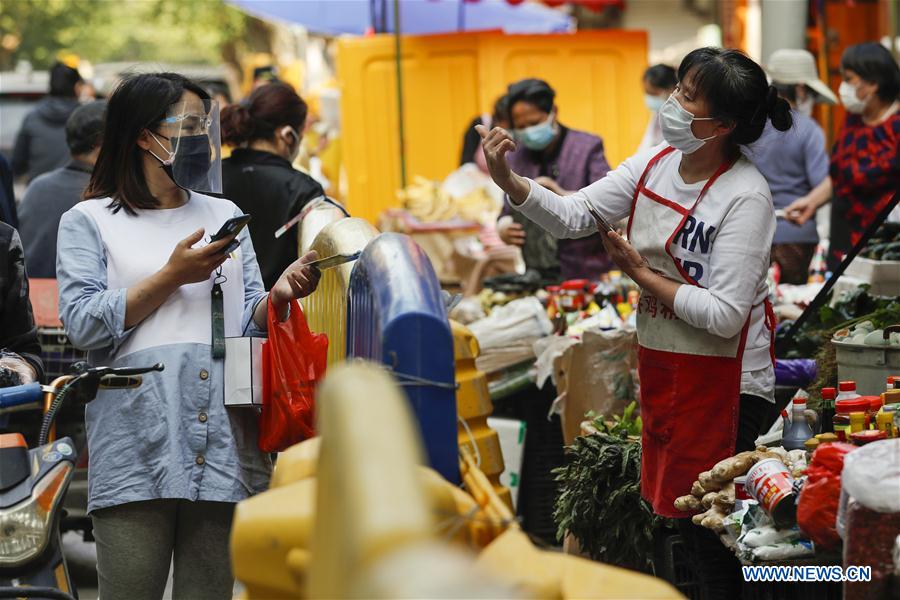Chinese cities launch voucher programs to spur consumer spending
China.org.cn by Cui Can,April 21, 2020 Adjust font size:

People buy food in Wuhan, Hubei province, on April 16, 2020. As the coronavirus epidemic wanes, life gradually returns to normal in Wuhan. [Photo/Xinhua]
On April 19, the city of Wuhan in Hubei province began issuing vouchers to spur consumer spending and support the resumption of work.
The vouchers, worth a total of 500 million yuan (US$70.7 million), are being issued digitally through online platforms like WeChat and Alipay. However, they can only be redeemed physically in shops and restaurant, as a way to encourage people to go out after a long period of self-isolation and quarantine.
Wuhan, the former epicenter of the COVID-19 outbreak, ended its 76-day lockdown on April 8. Retail sales, one of the major economic drivers for the city, came to a virtual halt during that time. According to local authorities, retail sales plunged 42.1% in the first two months of the year compared to 2019. The city is now using the vouchers to help stimulate consumer spending.
Even before Wuhan, various cities and provinces across China have already launched voucher campaigns to entice people to spend at restaurants, retail stores, and cultural and tourism-related businesses.
Gao Feng, spokesperson of the Ministry of Commerce, said earlier this month that vouchers in various forms have been handed out in seven provinces in China to boost spending. As of April 9, Hangzhou city in Zhejiang province had issued e-vouchers worth 220 million yuan, driving consumer spending by 2.37 billion yuan.
Unlike countries that gave direct cash handouts to people in need, China has opted to give citizens coupons. Expert explained that people in China have high levels of savings and need stimulus to spend money.
Liu Chunsheng, associate professor at the Central University of Finance and Economics, said cash subsidies have a limited effect on spurring consumption, because not all the cash will be spent, while vouchers ensure that money is allocated to retail sectors.
Pan Helin, an expert in economics at Zhongnan University of Economics and Law, said he believes the voucher programs would play an important role in revitalizing consumer spending in the short run.
To leverage the role of voucher in boosting consumption, Pan said local governments should give priority to low-income earners and small- and medium-sized companies that were hit hard by the outbreak. Studies show that, compared to those with higher incomes, low-income families are more willing to use the vouchers.
According to a survey conducted by Alipay, over 10 million businesses have benefited from the nationwide voucher campaigns, with over 90% of them being micro-, small- and medium-sized businesses.
Service sectors such as restaurants, sports, and cultural and tourism were hit hard amid the outbreak. Pan said that rolling out vouchers in these sectors would help them bounce back quickly and meet pent-up demands from consumers. In addition, consumer spending in these service sectors would not reduce spending on daily necessities, avoiding the crowding-out effects caused by the expansionary fiscal policy.
In order to better unleash the potential for economic activities, Pan said that local governments could require people to redeem the vouchers through lucky draws or first-come, first-serve basis, and set expiry date on consumption vouchers. This would encourage residents to go outside and spend money sooner, in a bid to ease the impacts caused by the outbreak.
However, some experts also pointed out that, in order to expand consumption in the long run, local government should focus on creating more jobs and increasing people's income.
Zhang Liqun, a researcher with the Development Research Center of the State Council, said that voucher programs could only be used as a temporary measure to revitalize consumer spending. Increasing the size of the "economic pie" should be the top priority for local governments at the moment.
